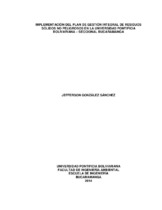Implementación del plan de gestión integral de residuos sólidos no peligrosos en la Universidad Pontificia Bolivariana - Seccional Bucaramanga

View/
Date
2014-06Author
González Sánchez, Jefferson
xmlui.dri2xhtml.METS-1.0.item-advisor
Director. Kopytko, María Irena
xmlui.dri2xhtml.METS-1.0.item-type
Trabajo de grado
Citación
Metadata
Show full item recordDocuments PDF
Abstract
El presente proyecto tiene como objetivo la Implementación del Plan de Gestión Integral de Residuos Sólidos no peligrosos en la UPB, seccional Bucaramanga. Inicialmente se realizó el diagnóstico del manejo de los residuos sólidos para tener un panorama actual sobre la gestión. Para lograr este diagnóstico, se realizó la revisión de la documentación de los programas del PGIRS de la Universidad, la verificación del seguimiento realizado a las actividades establecidas en el Plan, con los responsables asignados, se elaboró el inventario de los puntos ecológicos, la revisión de los cuartos de almacenamiento temporal de los residuos sólidos, se ejecutaron las caracterizaciones de los residuos sólidos generados en la Universidad, por último se inspeccionó las áreas de compostaje y lombricultura de la Institución.
En la segunda fase del proyecto, se utilizó la matriz DOFA, como método para la identificación de debilidades y fortalezas existentes en la Universidad, e igualmente, la identificación de amenazas y oportunidades a nivel externo. La relación entre estos cuatro componentes de la matriz, permitió elaborar e implementar el programa de educación ambiental y el programa para el aprovechamiento de materiales generados en la Universidad.
Finalmente, se realizó seguimiento a las diferentes actividades establecidas en los programas, mediante la elaboración de indicadores y evidencias. This project´s main objective is to implement the Nonhazardous Solid Waste Management Program in the Universidad Pontificia Bolivariana in Bucaramanga. Initially, a diagnosis of the solid waste management at the University was performed, in order to have an initial overview of this process. To achieve this diagnosis several activities were carried out: a review of the documentation of the NSWMP programs at the University, the verification with the responsible agents of the monitoring activities established in the Plan, the preparation of the inventory of ecological points, the review of the temporary storage rooms for the solid waste, the characterizations of the solid waste generated at the University, finally the areas of composting and vermiculture of the Institution were inspected.
During the second phase of the Project, the SWOT matrix was used as a method to evaluate the strengths and weaknesses, internal to the institution as well as the opportunities and threats presented by the environment. The interrelation between these factors allowed to elaborate and to implement the Environmental Education Program and the program for the use of materials generated by the University.
The final activity was the monitoring of the different activities established in the programs, through the making of indications and evidences.
Keyword/s
Ingeniería Ambiental
Universidades - UPB (Universidad Pontificia Bolivariana)
Diagnóstico
Compost
Lombricultura
Educación ambiental
Collections
- Trabajos de grado [6698]
The following license files are associated with this item:

